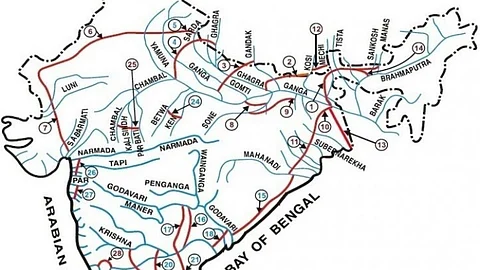
- Topics
- Feature
- Opportunities & Events
- Data
- Hindi Portal
- Topics
- Feature
- Opportunities & Events
- Data
- Hindi Portal

The analysis of the weather data for 103 years, conducted by IIT Mumbai and Chennai, shows a significant decrease in the rainfall in the major surplus basin raising a question about the sustainability of the interlinking of rivers. The panel has suggested reanalysing and re-evaluating the interlinking project taking the changes in the weather patterns into consideration. Even the environment minister has suggested completing one interlinking project and studying its impact before going for others.
The Karnataka cabinet has decided to stop the release of water for agriculture in the southern and the coastal parts of the state as the region is facing serious water crisis owing to deficient monsoon. Along with this, the government has earmarked nearly Rs 30 crore for cloud seeding despite the estimation of success in achieving rainfall is just 30 percent. Also, the authorities have been directed to reach out to the farmers via Irrigation Consultative Committees (IRCC) and discuss the release of water on a bare minimum basis.
As per the Integrated National Fisheries Action Plan 2020 prepared by the Centre, the ambitious Neel Kranti project will require an investment of Rs 17,199 crore. The aim of the project is to increase the fish production by 50 percent and thereby triple the export earnings to Rs 1 lakh crore by 2020. In order to meet the fund requirements, the government has begun talks with World Bank and Asian Development Bank while planning to rope in global consulting firm Accenture for production management support.
For the first time, revamping of the largest canal system of India, the Indira Gandhi Nahar Project, has been proposed. The renovation of the 60-year-old canal system is aimed at reducing seepage and increasing the irrigation intensity by about 1.80 lakh hectares in the seven districts of Rajasthan by efficient use of water. As per the proposal worth Rs 3,264 crore, there are plans of complete restructuring of the canal system and realignment of the main canal and branches.
A massive landslide-- a hillside spanning around 100 metres slid off-- had occurred in Upper Dzongu in north Sikkim. The debris from the landslide collected over the Kanaka river, a tributary of the Teesta river, creating a huge natural dam that has a base width of 100 metres and depth of 200 metres. The situation is being assessed and as a precautionary measure, high alert has been issued and the evacuation of people residing in the low-lying areas and downstream of the Teesta river been taken up.
This is a roundup of important news updates from August 7 - 14, 2016. Also read last week's policy matters update.
Lead image source: National Institute of Hydrology